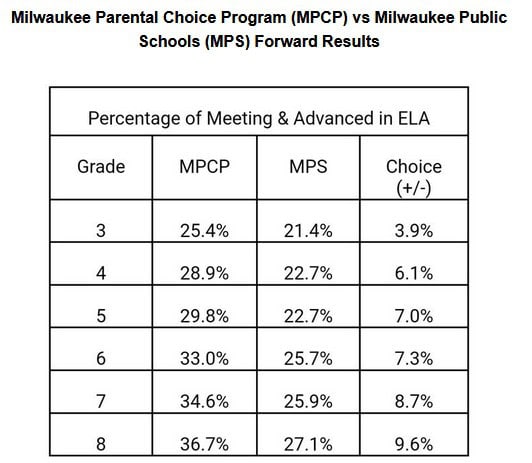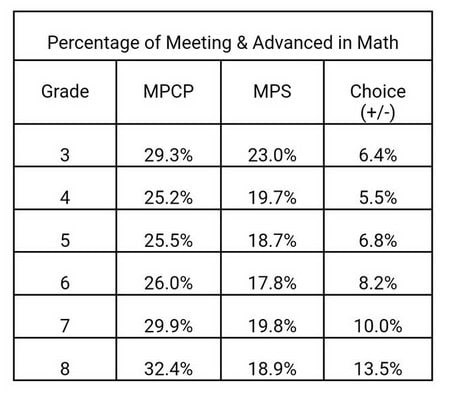Milwaukee and Racine data – the fairer comparison – shows private choice students outperform public school students in 32 of 36 grade-level comparisons.
This is an opinion piece.
Half-truths are contemptible. As the Oxford Dictionary explains, half-truths “deliberately convey only part of the truth in order to deceive someone.”
DPI issues half-truths on an annual basis, when it releases state test scores that compare students from low-income and moderate-income families with all students statewide. They do it even though they know it is deceptive. Here’s the half-truth from DPI’s Oct. 8 press release:
“For 2023-24, assessment results show public school student proficiency rates in English language arts and mathematics were at 48 percent and 49.4 percent…Students participating in the state’s Private School Choice Programs had proficiency rates of 30.9 percent (ELA) and 28.3 percent (mathematics)…
This is classic false equivalency. Pure apples and oranges. No reputable scholar would contend that students from poor Milwaukee or Racine families should be compared with a statewide sample composed mainly of students in middle-income and upper-middle income families. Yet this is exactly the comparison that DPI offers each year to support the false argument that school choice is “not working.” The bogus claim makes its way into news articles, social media, and legislative offices — where the fate of school choice rests.
There are honest comparisons. School Choice Wisconsin makes them — using DPI data. For example, we compare private Milwaukee choice students with students from Milwaukee Public Schools. We also compare private Racine choice students with those in the Racine Unified School District. Lastly, we compare low-income students in the statewide program (outside of Milwaukee and Racine) with low-income public school students.
While the cohorts we use are not demographically identical, they come as close as available data allow to providing honest comparisons. They tell exactly the opposite story of the false impression – created deliberately to deceive – from DPI.
Specifically, the DPI data we report show private choice students outperforming public school students in 32 of 36 grade level comparisons.




ACT Results
Also noteworthy is the fact that, on average, private choice students from low-income and moderate-income families actually outscore public school students from all families on the college-readiness ACT test. Not surprisingly, DPI’s release does not address ACT scores.

The DPI data we report is nowhere to be found in the agency’s Oct. 8 press release. Finding it requires a deep dive – where few reporters or taxpayers venture – into the agency’s website.
It is both troublesome and unsurprising that the constitutional agency of state government responsible for education oversight would peddle half-truths. It continues a decades-long campaign of falsehoods by opponents of giving parents more education options.
Nic Kelly is the President of School Choice Wisconsin
Table of Contents








![Governor Caught Playing Politics with Brillion Residents’ Lives & Livelihood [COLUMN] ron tusler](https://www.wisconsinrightnow.com/wp-content/uploads/2025/07/MixCollage-15-Jul-2025-03-35-PM-9568-265x198.jpg)



![Protecting Portland: No Good Deed Goes Unpunished [REVIEW]](https://www.wisconsinrightnow.com/wp-content/uploads/2025/07/portland-265x198.jpg)